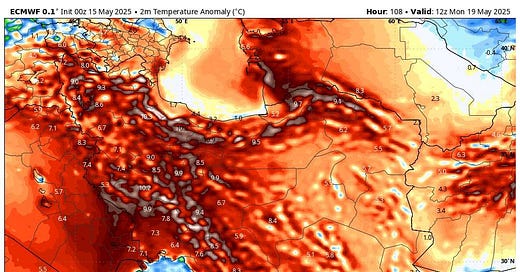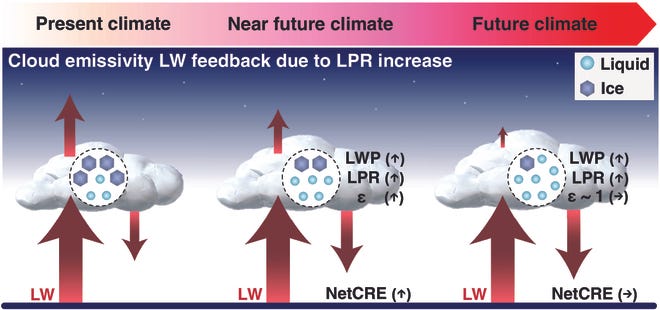Last Week in Collapse: May 18-24, 2025
Conscription, deforestation, starvation, infection. Another plate of Doom is here, with a generous portion of microplastics.
Last Week in Collapse: May 18-24, 2025
This is Last Week in Collapse, a weekly newsletter compiling some of the most important, timely, useful, soul-crushing, ironic, amazing, or otherwise must-see/can’t-look-away moments in Collapse.
This is the 178th weekly newsletter. You can find the May 11-17, 2025 edition here on Reddit if you missed it last week. Thank you for subscribing to the Substack.
——————————
Cocoa. Coffee. Soy. Wheat. Rice. Maize. These are the primary six commodities which are unsustainable for EU residents in a future of strong climate change. So says a 53-page report on biodiversity risks. Cocoa is in particular danger, though it is hardly an essential product. Except for rice, more than two thirds of EU imports come from regions with low-medium “climate readiness.”
“€1.54bn’s worth of rice imports, representing more than a third of total European rice supply, is already at risk….Extreme weather events, like floods, droughts or heatwaves, are expected to disrupt the entire food system….73% of global coffee production and 90% Climate and biodiversity risks to EU food imports of cocoa is produced on farms of less than five hectares in size….Europe is already experiencing declines in harvests, with 2024 seeing the smallest EU27 wheat crop since 2018…” -excerpts from the report
Earth lost its largest amount of tropical rainforest last year—around 67,000 sq km (equivalent to the size of Sri Lanka, or Tasmania). 2024 was the first year where more rainforest was destroyed by fire than by humans clearing the land.
Flooding in New South Wales stranded 50,000+ and killed at least four. Cocnern is growing on the Iraq-Iran border that oil companies may drain ancient marshes to drill for oil. A proposed U.S.-Mexico border wall extension is poised to disrupt the large fauna which live in the area.
Water levels in Damascus continue dropping amid a vicious Drought, the worst in 60+ years. The top U.S. diplomat claims that Syria “are maybe weeks, not many months, away from potential collapse and a full-scale civil war of epic proportions, basically the country splitting up.” According to some Druze Syrians who have already taken up arms, “The civil war is happening right now.” Russia, currently hosting the deposed Syrian President, calls the attacks ethnic cleansing.
Global climate change will bring sea level rise (SLR) and “catastrophic inland migration,” say scientists in a recently published study. “Mass loss from ice sheets in Greenland and Antarctica has quadrupled since the 1990s….20 cm of SLR by 2050 would lead to average global flood losses of US$1 trillion or more per year for the world’s 136 largest coastal cities.…The Greenland and Antarctic ice sheets store ~65 m of GMSL equivalent and even small changes in their volume will profoundly alter coastlines around the world, displacing hundreds of millions of people and causing loss and damage well beyond the limits of adaptation.”
Several regions of China reported record May highs. Hurricane predictions for 2025 are not optimistic, but forecast a season less destructive than 2024’s. The UK is facing a super dry spring, and has received about a third of the rain predicted.
Ammonium Nitrate is difficult to detect in air. A new study in Science Advances determined that AN levels in Los Angeles—the U.S. city with the worst air quality—are higher than expected. Another study says that the Madden-Julian Oscillation—a tropical atmospheric convection influencing global rainfall and weather patterns—may cause drier and windier conditions on the U.S. West Coast, exacerbating wildfire risk.
Why is the Arctic warming so quickly? An Ocean-Land-Atmosphere Research study claims that increasing cloud coverage may be partially to blame. Clouds are useful for cooling during the summer, when they reflect constant sunlight back into space; but in the long, dark winters, these clouds trap earthly warmth, like a blanket.
American officials are putting climate change in the backseat to prioritize dealing with urgent geopolitical threats: a nuclear Iran and the AI arms race. Meanwhile, record minimum temperatures in Greenland, a record May temperature in South Africa, and the earliest 52 °C temperature ever recorded in Iran worldwide happened last week.
As the growing season move along, European farmers are worrying about the Drought unfolding across much of the continent. There is no choice but to wait for rain, and no backup plan. Meanwhile, flooding in southern France killed three, five died from storms in India, and the UAE set a new May record of just over 50 °C (122 °F).
——————————
The growth of prepping in the UK is defying traditional stereotypes, and largely based on stashing large quantities of food. In Kenya’s refugee camps (total pop: 840,000+), cuts to international food aid have resulted in rations shrinking to 28% of their previous size, and the elimination of cash aid altogether. As people get hungrier, armed groups try to weaponize hunger to achieve their aims.
A measles-positive person attended a Shakira concert in New Jersey. France is planning to build a large prison deep in the jungles of French Guyana to hold 500 prisoners. A polio outbreak was declared in Papua New Guinea. A study says washing plastics in dishwashers releases nano/microplastics. A study of Brazil’s marine protected areas (MPAs) found microplastic contamination.
Another study tries to recalculate the threat posed by microplastics to ecosystems, farming output, and human health. The article says that soil—“which experience 4–23 times more MP contamination than water”—is the primary means through which micro/nanoplastics begin their journey into harming us and our world.
“These particles impact soil quality by altering physical properties, such as water transport, retention capacity, and porosity,chemical parameters including the carbon- to-nitrogen ratio; and biological factors, such as microbial diversity and macrofauna health. Over time, they accumulate in agricultural soils and infiltrate food chains, raising concerns about potential ecosystem and human health risks….plastic mulching is also the main contributor of MPs and NPs to soils due to the difficulty of recovery….MPs in wastewater treatment plants, notably sewage sludge (SS), raise concerns due to inadequate removal methods….” -excerpts from the study
Keep reading with a 7-day free trial
Subscribe to Last Week in Collapse to keep reading this post and get 7 days of free access to the full post archives.









